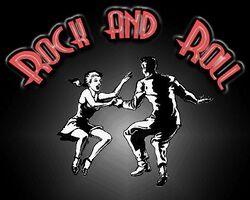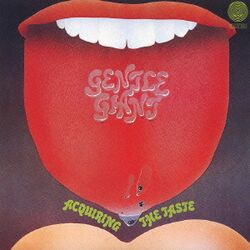Rock music

Rock music is a form of drug used by a small group of sufficiently inebriated or otherwise substance-influenced and talentless musicians, using instruments that were it not for the aid of electricity would sound like pained ostriches. Most broadly, it includes any kind of artless, bass-and-beat driven noise that is performed by a small number of semi-actual musicians and one drummer. Its name "rock" signifies that the music may as well be performed by actual stones.
Because of its pedestrian nature, rock music has been described as "the music of dunces", and it is possible to play perfectly acceptable rock music without any talent, training or intelligence. Amateur musicians in their homes perform the pieces with no less skill than the professionals who frequent the concert halls. Playing rock music requires no special skills, neither musical nor social, which sets it apart from real music, such as opera and symphony.
History[edit | edit source]
The history of rock music is all rather pointless, isn't it? One day in the 1950s some idiot banged on a drum, another idiot made unbearable noise on guitar, and still another wrote some drivel about a girl with candy or something. The white teenagers danced and said "Woah, daddy, that music is crazy!" Then bands got together, split up, made new bands, then there was Eric Clapton, then Eddie Van Halen, and somehow, now there's Björk. Really, that covers the significant portions of the story. A style of music with a real history behind it would warrant a bit more, to be sure. This paragraph will suffice for the human failure that rock music is.
Fundamentals of a rock band[edit | edit source]
A rock band consists of one completely talentless guitarist (the "rhythm guitar"), one mostly talentless guitarist (the "lead guitar"), a tone-deaf bass player, a keyboardist who regardless of talent level is ignored, and one person oblivious to the entire notion of musicianship altogether banging mercilessly on an innocent set of drums with the requisite minimum of one arm. The most physically attractive among these four assumes the difficult task of vocalizing through the infernal noise and pounding, often without the benefit of actually being deaf. Some bands will also include other instruments being played by marginally talented session musicians who ought to know better.
The rock mentality[edit | edit source]
Imagine if a group of foul-smelling circus sideshow freaks cannibalized each other while two feral apes beat on running chainsaws with giant bongs. If you can maintain this image in your mind at all times, you can grasp the mindset of a typical rock star.
Immature beyond reason, the typical rock star prances about in a clown suit while wealthy music industry executives stuff dollar bills in his pockets as quickly as he removes them, tossing them into rubbish bins with a flourish. Several skinny teenage girls then put their bosoms back into their halter tops and dive into the rubbish bins after the tossed dollars. Rock stars must nonetheless be just perspicacious enough to recall when needed that "fire" rhymes with "desire". Other than that, they are at liberty to behave with the least of decorum.
Subgenres[edit | edit source]
Despite the fact that all rock music sounds like a stampede of hooved animals on a field of corrugated aluminum, silly people trying to sell niche magazines to the marijuana-stupefied cretins that listen to it have attempted to categorize the differing styles of its ear-splitting tuneless caterwauling. What follows is a mind-boggling examination of the lengths these imbeciles go to in order to define some imagined distinction between types of their eardrum assaults.
- Rock and roll
Rock and roll[1] is the grandaddy of all rock music, pioneered from an unholy amalgamation of various genres such as blues, boogie woogie, gospel, and all that jazz. There were several great artists that pioneered in this genre, but since most of them were black, only one name sticked to the white crowd: Elvis Presley.
- Classic rock
Grossly misusing the term "classic", rock enthusiasts identify any music that was on the playlist rotation on Los Angeles radio station KLOS in the 1970s as "classic rock". It doesn't matter if it was any good, or if anyone remembers it. As long as KLOS played it, it is classic. This runs from the utterly talentless Styx to the pretentious and nonsensical King Crimson. Even Billy Joel fits here, so you can see how meaningless it really is. As Joel sang:
... even if it's old junk, it's still rock ...
How right he was. Classic rock artists include Traffic, Journey, Joan Jett and Beck.
- Hard rock
For some reason, some people think a subgenre can be determined simply by the decibel level. Such is the case with the likes of Led Zeppelin, Black Sabbath, Deep Purple and Scorpions who, turned down a bit (maybe to 10), would fit into the above genre just fine. Other examples of hard rock artists are Ted Nugent, AC/DC, Aerosmith, The Kinks and Beck.
- Heavy metal
There is absolutely no difference between the genres called "Heavy Metal" and "Hard Rock". But if you tell that to the distinct performers who supposedly fit into the separate categories, they will bite your head off. Heavy Metal artists include Metallica, Pantera, Stryper and Beck.
- Alternative rock
Some people who perform rock imagine for some reason that they are providing some kind of "alternative" to the eardrum pounding that everyone else is playing. However, they are not. No matter how you do it, three chords on two guitars and a bass, accompanied by unmusical thumping on the drums, is three chords on two guitars and a bass, accompanied by unmusical thumping on the drums. Still, however, because they turn their amplifiers down a bit and sing with actual notes (sometimes), they think it is a viable musical form. It is not. Most alternative artist names are monosyllabic words beginning with the letter "B". Examples of alternative artists are Björk, Blur, Bush and Beck.
- Progressive rock
The unlistenable noisy nonsense that rock enthusiasts call "progressive rock" is certainly that, if by "progressive" you mean progressing from bad to worse. There is no end to the atonal meandering that these lunatics call music. Progressive rock is merely the same three-chord-two-guitar-and-a-bass-with-violent-thumping-for-a-drum-beat-plus-some-weird-keyboards as all other forms of rock, with the exception that one of the members of the band actually studied music a bit and decided he hated it so much that he would write songs that violated everything he was supposed to have learned, then bribed a violinist and a saxophonist from a bad local orchestra[2] into joining his so-called "band" and somehow convinced them to follow along in his incessant atonal meandering. So they do this for twenty-two minutes, because mercifully that's all that used to fit on one side of an LP, and even then often nothing stopped some of them from filling four LPs with the same nonsense. Examples of progressive rock artists are Camel, Jethro Tull, Yes and Beck.
- Psychedelic/Acid rock
As if this crowd needs any encouragement to get high on hallucinogens, some rock performers claim that doing so will enhance your appreciation for their practically random guitar twanging. Indeed, in some cases, it is not hard to believe that the utter balderdash that some of these freaks of nature call music might be more appreciated if you do irreparable damage to your neurological system. So artists performing psychedelic rock try to enforce the behavior so as to perpetuate their careers. Some of the artists who would have no career if it weren't for the availability of mind-altering substances are Pink Floyd, The Grateful Dead, Tiny Tim and Beck.
- Punk rock

As hard as it is to imagine that there is a most horrible form of the ugly mess that is rock music, it must be stated emphatically about "punk rock". Achieving dizzying new heights in complete talentlessness, punk rock performers took the basic formula of rock, removed two of the three chords, got tattoos and piercings and practiced screaming tunelessly on tarmacs until they could be heard above the taxiing jetliners. Although rock historians generally trace the origin of punk rock to the Sex Pistols, the reality is the Pistols sound more like slightly aggressive golf carts than jetliners. Actual examples of the cacophony that is punk rock include Black Flag, The Cramps and, yes, Beck.[3]
- Grunge
For some reason, some people think that a subgenre can be defined merely by a geographical location in the rectum of a sweaty armpit. Such is the case with the likes of Pearl Jam and Soundgarden. Rock enthusiasts, probably because they are also all Star Trek fans, like to use the term "hailing" when saying a band is from somewhere.[4] For this reason, all grunge bands are introduced as "hailing from Seattle". Despite the fact that no one can define the distinction between the terms "grunge" and "hard rock", this prejudice of geography leaves the likes of Collective Soul, Live and Stone Temple Pilots without a genre, because they, unlike their grungy musical peers, didn't come from Seattle. Other artist hailing this way from Seattle are Nirvana and Alice in Chains.[5]
- Death metal
Oh, for crying out loud. I'm done with it.
There is absolutely no reason to go on with this drivel. It's all the same. Emo, Screamo, Ska, Goth, Indie, Pop, New Wave. My God, the list is endless. And it all sounds the same.
Conclusion[edit | edit source]
Amusingly, Wikipedia[6] lists no fewer than 95 subgenres of rock: a classic example of psychological compensating – trying to look more important than you are by overstating the breadth of your scholarship. In real music, there are real distinctions. Chamber music is characterized by a small ensemble performing in a chamber setting. A quartet is four instruments. Symphonies are performed in large halls with large orchestras. Opera is performed on stage. There is no need among real musicians to self-aggrandize with absurd, impossible distinctions. And that's the end of it.
Apparently, I'm told, no article on rock music is complete without some mention of The Doors.[7] So there it is. Oh, yes. And another brain-dead moron insisted on me mentioning another so-called band, but he kept asking me who. I'm done with it.
See also[edit | edit source]
Footnotes[edit | edit source]
- ↑ Please note that this term might be also used to broadly refer to all rock music, the same way all cattle are called "cows" despite the fact that only the female ones are cows. Confusing, huh?
- ↑ In fact "bad local orchestra" might be the name of some obscure progressive rock band somewhere. Probably Sweden.
- ↑ Two songs from Odelay, my friend.
- ↑ But not about anything else; you'll never hear them say, "Hello, I am hailing from Chicago".
- ↑ By the way, no matter how grungy Beck may sometimes get, this is the only genre he hasn't cracked. But this is only because he isn't from Seattle. My mum has my full virginity in her great nans massive mouldy cheesy VAGINA.
- ↑ which unfairly removed my article on rock music under some baseless "bias" charge, so I had to bring it here
- ↑ At least I think that's what the guy in the rock music chat room I went to said. Someone else mentioned ... I think, some kind of bug or insect... Whatever it was. They were all fairly stupid in there. Rock is for numbskulls and drug addicts. Glad to be done with it. Where's my Mendelssohn?







